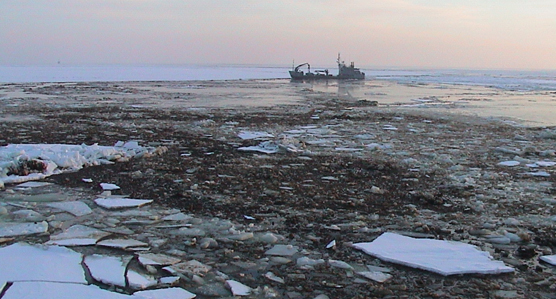
Combating oil spill in arctic conditions. © SYKE
Aims
The project focuses on developing, comparing and evaluating the effectiveness and environmental effects of different oil spill response methods in a cold climate. In addition, to this we develope a system for the real-time observation of underwater oil spills and a strategic tool for choosing oil spill response methods.
The results of the project will be made available for use to international organizations that plan and carry out cross-border oil spill response cooperation in Arctic sea areas. The full name of the project is ”Integrated oil spill response actions and environmental effects – GRACE".
Objectives
The overall objectives of the project are to:
- explore the true environmental impacts and benefits of a suite of marine oil spill response technologies in the cold climate and ice-infested areas in the northern Atlantic Ocean and the Baltic Sea. The response methods considered include mechanical collection in water and below ice, in situ burning, use of chemical dispersants, natural biodegradation and combinations of these;
- assess in particular the impacts on fish, invertebrates (e.g., mussels, crustaceans) and macro algae of naturally and chemically dispersed oil, in situ burning residues and non-collected oil using highly sensitive biomarker methods, and to develop specific methods for the rapid detection of the effects of oil pollution on biota;
- improve the observation, monitoring and predictions of oil movements in the sea using novel on-line sensors on vessels, fixed platforms incl. gliders and smart buoys together with realtime data transfer into operational systems of oil spill situational awareness;
- develop a Strategic Net Environmental Benefit Analysis tool for oil spill response strategy and decision making in cold climate and ice-infested areas.
Concept and approach
The project includes a genuine trans-disciplinary consortium with experts from Europe and Canada in the fields of oil monitoring and on-line observations, oil spill response authority, bioanalytics and environmental impact assessment, monitoring and assessment of the fate of oil pollutants, experimental studies, biotechnology related to oil degradation, and oil spill response technology development.
Expected impacts
- Mitigate negative impacts of oil pollution and response activities on the marine environment, coastal economies and communities
- Better decision support tools for oil spill response strategy in different conditions.
- Improve the integration between the scientific community and relevant government agencies charged with dealing with pollution, including cross-border and trans-boundary co-operation
- Better business potential for companies producing oil response equipment and monitoring services
- Increased public acceptance of off shore activities through a thorough environmental assessment of the environmental impacts of different response methods.
More information
- Project co-ordinator, Leading Research Scientist Kirsten Jørgensen, Finnish Environment Institute SYKE, firstname.surname@ymparisto.fi